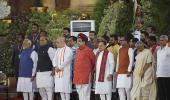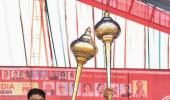'Episodes of targeted attacks on Muslims established that for a section of people and, sadly, even officials of the State, the election results conveyed no lessons.'
'Opposition parties must not be hesitant in speaking out whenever the mob with tacit State support targets Muslims,' asserts Nilanjan Mukhopadhyay, author of Narendra Modi: The Man, The Times.

All photographs in this feature have been posted only for representational purposes. Photograph: Adnan Abidi/Reuters
Indian Muslims were among those greatly relieved with the Bharatiya Janata Party with Narendra Modi at its helm, not securing again a clear majority of its own. But will the fact that Modi is no longer a 'lord' onto himself, and is instead dependent on coalition partners with potential to be exacting at times, make India a communally less-polarised nation?
Will Muslims be able to once again lead a more zestful life, no longer having to constantly look over their shoulders to check if a marauder's arm or a lynch brigade was reaching out for them?
Questions arise because within days of the election results, several incidents across several states, notably Chhattisgarh, Madhya Pradesh, Uttar Pradesh, Gujarat, Rajasthan and Telangana made it clear that although the verdict may have been reassuring there was little change in people's actions.
These episodes of targeted attacks on Muslims established that for a section of people and, sadly, even officials of the State, the election results conveyed no lessons.
The script was eerily familiar in Chhattisgarh, where a mob of cow vigilantes detained a truck within Raipur district in which three Muslims men were transporting buffalos from Uttar Pradesh to adjoining Odisha.
The crowd took law into their hands and in the violence perpetrated on the alleged cattle-smugglers, all the three men died.
In MP's Mandla district, the state government performed the role of the mob and dished out bulldozer justice to eleven Muslim families by demolishing their homes.
Brazening it out, Chief Minister Mohan Yadav, obviously exuberant after the BJP swept all 29 seats in the state in the Lok Sabha polls, decided to observe this year as Gauvansh Raksha Varsh (bovine protection year).
The houses which were demolished had been allegedly built on government land. But, the reason cited for sending the bulldozers to raze the houses was the allegation that these families were key players in the illegal beef trade in the state.
The state government alleged that following a tip off, they discovered beef in the refrigerators in these eleven houses and thereafter decided to demolish the houses.
Tellingly, the local superintendent of police stated that the meat seized from these houses, was found to be beef by the local government veterinarian.
However, it is well known that often buffalo meat, whose trade and consumption is permitted, is often mistakenly assumed to be cow meat.

In September 2015, in the first such publicised incident after Modi became PM, in Dadri in UP, Mohammed Akhlaq was lynched to death on suspicion of storing beef in his house, although a forensic test later established that it was not cow meat.
It is necessary to recall the Dadri incident because the political response to it was contrasting.
While Modi, back from the United States after his maiden visit as PM, remained silent, several Opposition leaders including Rahul Gandhi and Arvind Kejriwal condemned the incident and went to commiserate with the family.
The issue also figured significantly in the Bihar assembly elections with the Rashtriya Janata Dal and its allies, including the Nitish Kumar-led Janata Dal-United and the Congress, raked up this matter to garner the secular anti-BJP vote.
In contrast, now, almost the entire Opposition remained silent not just on the recent Chhattisgarh and MP incidents, but on the others too.
Quite clearly, the Opposition parties are diffident about speaking out when 'politics of hate' manifests itself.

Does this mean that attacks on Muslims by vigilante groups and even government forces merely on suspicion is the new normal?
Does the passive response of Opposition parties demonstrate that these parties do not have the political courage to articulate concerns of the Muslims and even the Christians, because it fears backlash from Hindus?
It is well known that even the Congress was cautious in fielding and deploying its Muslim leaders in elections from the first general elections onwards.
But in recent decades there has been significant fall in number of Muslim candidates fielded not just by the Congress, but even other non-BJP parties.
The guilt for shrinking Muslim presence in Parliament is not solely that of the BJP and its coalition partners.
At 78, the total number of Muslim candidates in the fray this time is an all-time low -- significantly lower than 320 in 2014.
The total number of 26 Muslim Lok Sabha members, this was the same number in the 17th House, is way below their proportion in population.
Importantly, even parties which avowedly pursue secular politics and are active in states with significant Muslims presence, like the Samajwadi Party and Trinamool Congress, significantly reduced the number of their Muslim candidates.
Very significantly in the Moradabad Lok Sabha seat, the SP did not field its sitting Muslim MP and instead put up a Hindu upper caste woman.
Despite the fact that the constituency has more than 45% Muslim voters, the SP candidate defeated the BJP nominee.
With an eye on the Muslim vote the Bahujan Samaj Party put up a Muslim candidate, but he polled only slightly more than 90,000 votes, in contrast to the SP nominee's vote share of 637,000.
Quite clearly, the Muslim voters cast their lot tactically and backed candidates with the best chance to worst the BJP nominee.
It is evident that the community has not turned against opposition parties for selecting fewer Muslim candidates.
But, choosing to remain silent when Muslims are attacked by lynch-armies backed by the BJP and its affiliates, with tacit support of the government, will be little but self-defeating politics.
While it will be premature for non-BJP parties to begin fielding Muslims with gusto, but it is time to intervene in debates whenever violent incidents occur, and when the State plays a partisan role, as it did in Mandla and Ratlam where in a separate episode the homes of four Muslims were demolished by the state administration after charging them with throwing bovine remains inside a temple.

Marginalising communal politics and ensuring that Muslims live with dignity will be a long haul and Opposition parties cannot baulk from the pursuit of secular politics due to fear of antagonising the majority community.
As Verdict '24 has demonstrated, there are regions in India where people are beginning to withdraw support to communal and divisive politics.
In the course of his Bharat Jodo Yatra, Rahul Gandhi evolved a radical vocabulary of secularism and found support for this among people besides securing backing of some opposition parties.
His coinage of running shops of mohabbat (love and affection) in the market of nafrat (hatred) must not remain just that.
Instead, the sense articulated through the slogans has to become second nature.
The Opposition must gain courage and believe that advocating for peaceful coexistence among various religious communities is the original credo of India.
In the same vein, it must argue that the Hindutva worldview of unitarist cultural nationalism was rejected by people for decades after Independence.
Divisive politics based on hate and prejudice gained support only through the decades-long Ram temple agitation. But, as some sections of Indians made it obvious in the elections, there are limits to such politics.
Opposition parties must not be hesitant in speaking out whenever the mob with tacit State support targets Muslims.
It must be communicated to people that no Indian Muslim should be made to feel that their ancestors took a wrong decision during Partition to remain in the nation of their birth where religion was not the basis of nationalism.
Nilanjan Mukhopadhyay is an author and journalist based in Delhi-NCR. His latest book is The Demolition, The Verdict and The Temple: The Definitive Book on the Ram Mandir Project. He is also the author of Narendra Modi: The Man, The Times.
Photographs curated by Manisha Kotian/Rediff.com
Feature Presentation: Rajesh Alva/Rediff.com











 © 2025
© 2025